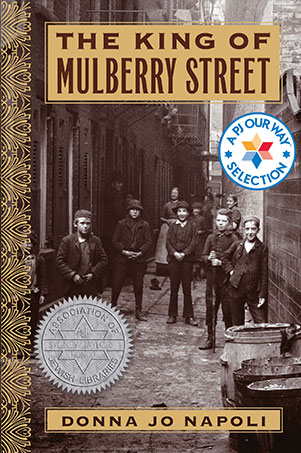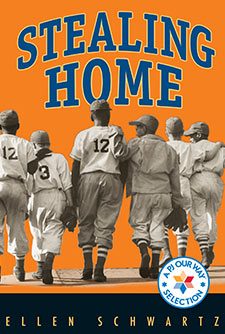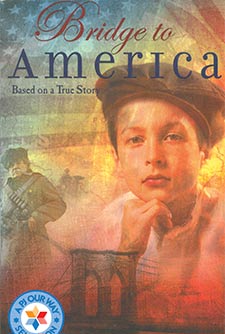The King of Mulberry Street
Nine-year-old Beniamino’s a stowaway on a ship headed to America! He has no family, no home, and no English – all he has are his wits and a shiny new pair of leather shoes. Will they be enough?
Average Rating
( hint: Login to leave a review! )
31 Reviews
Leave Review
What the Book is About
Jewish Content & Values
Positive Role Models
Content Advisory
Talk it Over!
More for You
What the Book is About
The year is 1892 and nine-year-old Beniamino is a stowaway on a ship from Naples, Italy, bound for America. He’s all alone, and he will need his quick wits to get through Ellis Island on his own and survive on the streets of New York City. Along the way, he encounters colorful characters, many of them desperately poor villains, thieves, and rascals, but Beniamino never loses his kind heart and good manners. Through hard work, a plucky entrepreneurial spirit, and friendship, Beniamino (now called “Dom”) manages to create a home for himself and do what his mother told him to do: survive.
This is a fast-paced and gripping work of fiction, inspired by the talented Donna Jo Napoli’s family history. Legend has it that her paternal grandfather an illegitimate, penniless stowaway from Italy, arrived in America alone at the age of five.
Jewish Content & Values
- Beniamino’s family are descendants of famous Napolitano Jews, and they are proud of their heritage. Beniamino wears a yarmulke and goes to synagogue. As a parting gift, Beniamino’s mother passes on his grandfather’s tzitzit, the tassels that adorned his tallit, his prayer shawl, but she warns Beniamino to keep his Jewish identity a secret while he is away from home.
- In New York, Beniamino manages to keep some kosher laws by not mixing cheese and meat. He asks the widow who cooks for him to avoid pork, shellfish, and horsemeat, and he even markets kosher sandwiches to the Jewish Wall Street workers. He eventually connects with the Eastern European Jewish immigrant community and, although their Ashkenazi/Yiddish traditions and language are very different from his Sephardi/Italian ones, he finds some comfort there.
Positive Role Models
- Beniamino/Dom is an inspiring role model. Even though he misses his mother terribly and is often hungry, homeless, and afraid, he never loses his spunky spirit. Despite the challenges of his circumstances, through kindness, honesty, and hard work, he manages to create friendships and a successful business. He even learns to forgive those who take advantage of his naiveté, and he always shares his good fortune with his friends.
- Grandinetti, the grocery store owner, deals honestly and kindly with Beniamino and his friends; he looks out for them and helps them with the details of their sandwich business.
- When some of the sandwiches get soggy in the rain, Tin Pan Alley/Pietro, the beggar boy, buys them from the business and distributes them to his beggar friends.
Content Advisory
This is a literary book with mature content and some scenes that will be hard for younger and more sensitive kids to read. We learn that a child has been murdered; other children are abused and abandoned and sleep on the streets. A man dies of cholera on a ship and is thrown overboard. Rats nibble at a bloated corpse in the catacombs beneath the city. These scenes give a realistic background to the life of a poor Italian Jewish immigrant and are matter-of-fact rather than graphic. The story also does not hide the fact that Beniamino’s mother is not married, and there are a few sexual innuendoes, although kids are unlikely to catch them: men hoot obscenely at a beautiful woman; it’s implied that a woman “working from home” isn’t only taking in laundry; and there is a vague suggestion that Beniamino’s mother might have offered the night watchman some sort of sexual favor in exchange for allowing Beniamino onto the ship.
Talk it Over!
When Dom, Gaetano, and Tin Pan Alley begin selling sandwiches, they make huge profits, charging their customers four times more than what the sandwiches cost them, but they quickly realize that running a business comes with lots of unexpected expenses: thieves, surprise rain showers, and slow sales days. Have you ever tried to run a business? Were you successful?
More for You
Jewish life in Naples dates back to the 1st century during the Roman Empire and it is described in the writings of Benjamin of Tudela, a Jewish traveler from the 12th century. The first Jewish printing press operated in Naples in the 15th century. Although the Jews were expelled from Naples by the Spaniards, by the mid 1800s the Rothschild family was operating a thriving branch of their European bank there. From the 1000 Jews living in Naples before World War Two, only 534 survived the war. Today, some 200 people form the Naples Jewish community, and they still pray at the very same synagogue in Via Cappella Vecchia that Beniamino visited on his last day in Naples.
What the Book is About
What the Book is About
The year is 1892 and nine-year-old Beniamino is a stowaway on a ship from Naples, Italy, bound for America. He’s all alone, and he will need his quick wits to get through Ellis Island on his own and survive on the streets of New York City. Along the way, he encounters colorful characters, many of them desperately poor villains, thieves, and rascals, but Beniamino never loses his kind heart and good manners. Through hard work, a plucky entrepreneurial spirit, and friendship, Beniamino (now called “Dom”) manages to create a home for himself and do what his mother told him to do: survive.
This is a fast-paced and gripping work of fiction, inspired by the talented Donna Jo Napoli’s family history. Legend has it that her paternal grandfather an illegitimate, penniless stowaway from Italy, arrived in America alone at the age of five.
Jewish Content & Values
Jewish Content & Values
- Beniamino’s family are descendants of famous Napolitano Jews, and they are proud of their heritage. Beniamino wears a yarmulke and goes to synagogue. As a parting gift, Beniamino’s mother passes on his grandfather’s tzitzit, the tassels that adorned his tallit, his prayer shawl, but she warns Beniamino to keep his Jewish identity a secret while he is away from home.
- In New York, Beniamino manages to keep some kosher laws by not mixing cheese and meat. He asks the widow who cooks for him to avoid pork, shellfish, and horsemeat, and he even markets kosher sandwiches to the Jewish Wall Street workers. He eventually connects with the Eastern European Jewish immigrant community and, although their Ashkenazi/Yiddish traditions and language are very different from his Sephardi/Italian ones, he finds some comfort there.
Positive Role Models
Positive Role Models
- Beniamino/Dom is an inspiring role model. Even though he misses his mother terribly and is often hungry, homeless, and afraid, he never loses his spunky spirit. Despite the challenges of his circumstances, through kindness, honesty, and hard work, he manages to create friendships and a successful business. He even learns to forgive those who take advantage of his naiveté, and he always shares his good fortune with his friends.
- Grandinetti, the grocery store owner, deals honestly and kindly with Beniamino and his friends; he looks out for them and helps them with the details of their sandwich business.
- When some of the sandwiches get soggy in the rain, Tin Pan Alley/Pietro, the beggar boy, buys them from the business and distributes them to his beggar friends.
Content Advisory
Content Advisory
This is a literary book with mature content and some scenes that will be hard for younger and more sensitive kids to read. We learn that a child has been murdered; other children are abused and abandoned and sleep on the streets. A man dies of cholera on a ship and is thrown overboard. Rats nibble at a bloated corpse in the catacombs beneath the city. These scenes give a realistic background to the life of a poor Italian Jewish immigrant and are matter-of-fact rather than graphic. The story also does not hide the fact that Beniamino’s mother is not married, and there are a few sexual innuendoes, although kids are unlikely to catch them: men hoot obscenely at a beautiful woman; it’s implied that a woman “working from home” isn’t only taking in laundry; and there is a vague suggestion that Beniamino’s mother might have offered the night watchman some sort of sexual favor in exchange for allowing Beniamino onto the ship.
Talk it Over!
Talk it Over!
When Dom, Gaetano, and Tin Pan Alley begin selling sandwiches, they make huge profits, charging their customers four times more than what the sandwiches cost them, but they quickly realize that running a business comes with lots of unexpected expenses: thieves, surprise rain showers, and slow sales days. Have you ever tried to run a business? Were you successful?
More for You
More for You
Jewish life in Naples dates back to the 1st century during the Roman Empire and it is described in the writings of Benjamin of Tudela, a Jewish traveler from the 12th century. The first Jewish printing press operated in Naples in the 15th century. Although the Jews were expelled from Naples by the Spaniards, by the mid 1800s the Rothschild family was operating a thriving branch of their European bank there. From the 1000 Jews living in Naples before World War Two, only 534 survived the war. Today, some 200 people form the Naples Jewish community, and they still pray at the very same synagogue in Via Cappella Vecchia that Beniamino visited on his last day in Naples.




